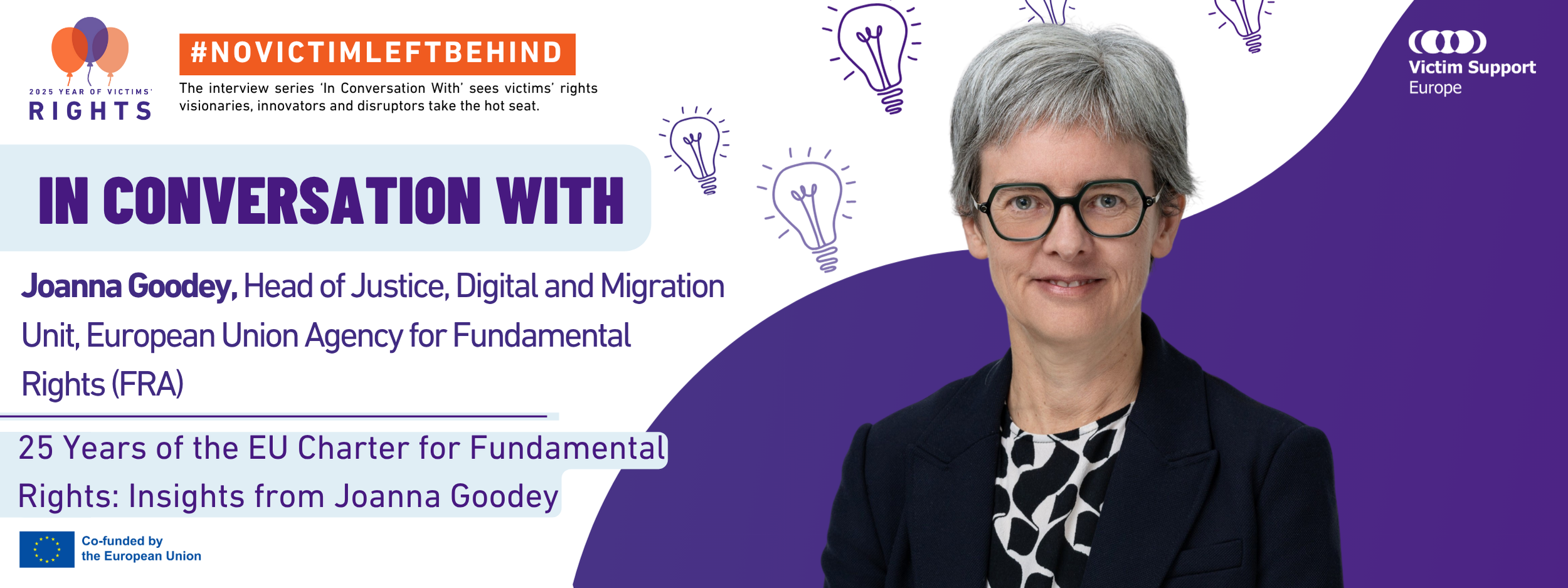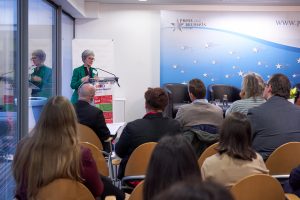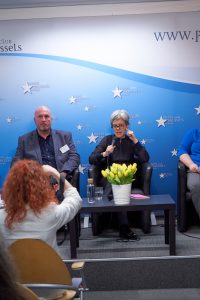

We interviewed Joanna Goodey, a senior expert on victims’ rights and Head of the ‘Justice, Digital and Migration’ Unit at the European Union Agency for Fundamental Rights (FRA), about her work and progress made on victims’ rights over the past 25 years since the adoption of the EU’s Charter of Fundamental Rights.
As we approach the close of our Year of Victims’ Rights campaign, she shares her insights on key achievements, ongoing challenges, and the future of victim protection across the EU.
Marina Kazakova, VSE: You have had a distinguished career in criminology, victimology, and fundamental rights. What initially inspired you to pursue this path, and what key moments have shaped your approach to advocating for victims’ rights?
Joanna Goodey, FRA: During my studies and my career as an academic in the UK in the 1990s, I was drawn to conducting research on the experiences of people living in high crime neighbourhoods and how their voices were – or were not – heard. I was particularly interested in how fear of crime and crime victimisation shapes how we navigate public and private spaces, and the very different impact this has depending on a person’s gender, ethnicity, socio-economic background and other factors. Essentially, people’s lived realities, and whether the law and public policy effectively respond to victims’ experiences of crime, was something that I was interested in addressing, including the undocumented experiences of particular groups such as children or trafficking victims. The interplay between victims’ needs and victims’ rights was an area that I decided to look into, as in the 1990s we saw an increasing recognition of victims’ rights in law and policy.

Joanna Goodey talking at VSE’s event “Leave No Victim Behind: Victims’ Rights and the Sustainable Development Goals” the 22nd of February, 2024.
Marina Kazakova, VSE: How would you assess the role of the EU Charter for Fundamental Rights in advancing victims’ rights over the past 25 years? Are there particular milestones where the Charter has significantly influenced policy changes or legal frameworks?
Joanna Goodey, FRA: The Charter is a powerful legal instrument that helps underpin that victims have rights, and that these rights apply when implementing EU law across the European Union’s Member States. In recent years the Charter has been increasingly relied on by legal practitioners and judges, including in landmark judgements that benefit victims of crime. It can be used in different ways to enhance victims’ rights – from access to justice and non-discrimination, through to human dignity and data protection. However, the Charter and secondary EU law – such as the Victims’ Rights Directive – is only as powerful as its application in practice.
Marina Kazakova, VSE: Based on FRA’s recent findings, what are the main areas where the implementation of victims’ rights is falling short in the EU? What recommendations would you highlight to address these gaps?
Joanna Goodey, FRA: Research by the European Union Agency for Fundamental Rights (FRA) has looked at the experiences of victims of crime, ranging from women who are victims of violence, victims of hate crime, trafficking victims, and more recently victims of online fraud. We have collected information from victims through our EU-wide large-scale surveys that ask about crime victimisation, through to our in-depth socio-legal research and interviews. A perennial struggle is how to make it possible for victims to come forward to report crime, so that offenders can’t act with impunity and victims can receive redress. This is not a new problem, but an age old one. Within the EU we are still – to an extent, although there are promising practices – falling short in treating all victims with dignity and respect, so that they feel able to report abuse and can receive recognition and support. Training is needed, but monitoring on how victims are treated and what information and support they receive in practice is important to see how authorities and services are performing.
Marina Kazakova, VSE: As we approach the end of 2025 and the reform of the Victims’ Rights Directive, what emerging challenges do you foresee in maintaining and improving victims’ rights within the EU?
Joanna Goodey, FRA: There is a need for robust data to be able to see how the implementation of the revised Directive will work in practice. FRA is ready to support the EU institutions and the Member States with its expertise and knowledge in this area, which can also benefit the work of civil society. In turn, we need to see how different ‘sectorial’ laws for specific categories of victims – from trafficking through to violence against women – can work in tandem with the revised Victims’ Rights Directive for the benefit of all victims. But arguably the greatest challenge is and will continue to be the growth in online crime victimisation – from online fraud through to online hate crime – which requires a joined-up response to effectively address online crime and ensure victims’ rights are met. To this end, FRA is directly researching the application of the Digital Services Act with respect to how the online world negatively impacts particular groups with respect to illegal and harmful online content, and is also researching the experiences of and legal responses to victims of online fraud.
Marina Kazakova, VSE: VSE’s Year of Victims’ Rights in 2025 is a significant moment for advocacy and policy discussions. How do you see FRA engaging with this initiative, and what role can FRA’s research play in helping VSE achieve its goals of universality, progress, and engagement?
Joanna Goodey, FRA: FRA has engaged and will continue to engage with Victim Support Europe as an important organisation for victims’ rights in the EU. As an EU Agency we can benefit from the insights and the issues that an umbrella organisation – such as VSE – offers, including engagement on the ground at Member State level. The role of civil society in supporting victims’ rights is key, and the universal message and practice of underlining that rights apply to all victims is something that the Fundamental Rights Agency promotes in its work. FRA’s data and research findings can be used by VSE to support its work, and FRA is ready to offer its expertise in this regard.

Joanna Goodey talking as part of a panel at VSE’s event “Leave No Victim Behind: Victims’ Rights and the Sustainable Development Goals” the 22nd of February 2024
Marina Kazakova, VSE: As an expert in research methodologies, how do you see the role of data and evidence in shaping the future of victims’ rights policies? What research gaps need to be addressed to ensure more targeted and effective policy interventions?
Joanna Goodey, FRA: Evidence-based policy advice is at the heart of FRA’s work, and data is essential to be able to assess the situation in practice concerning people’s experiences of crime, underreporting, services received, and redress – to name just a few examples. Data – which is collected in a transparent way using established research quality standards – allows us to assess what is and is not working ‘for’ victims, whilst also collecting information on the experiences and challenges faced by practitioners such as the police, lawyers, and civil society. Robust data can hold Member States to account with respect to how they treat victims in line with their legal obligations. But research gaps remain in key areas – for example, with respect to different forms of online crime victimisation and how it impacts various groups, as well as under-reporting of online crime and effective responses and support by the authorities.
Marina Kazakova, VSE: One of VSE’s key objectives for 2025 is to strengthen the victim support ecosystem. From your experience, what essential elements must be reinforced to create a truly comprehensive and victim-centered support system across the EU?
Joanna Goodey, FRA: Alongside differences in how victims experience crime and its aftermath, there are also common experiences that many victims share – such as the need for information and accessible reporting platforms, and to be treated with dignity and respect. While recognising the particular experiences and needs of certain groups or individuals, when referring to a victim support ‘ecosystem’ a key element is to look beyond ‘siloed’ approaches to recognise the collective need for interventions that recognise and put in place responses that are victim-centred for all. This is where a rights-based approach comes in as recognising the rights of all victims. A central element for any victim support ecosystem is to listen to victims, and to develop responses that fit their needs and are underpinned by law.
Marina Kazakova, VSE: Looking beyond 2025, what are FRA’s priorities for ensuring that victims’ rights remain high on the EU agenda? How can EU institutions, national governments, and civil society work together to secure long-term progress?
Joanna Goodey, FRA: The Agency’s priorities going forwards – with respect to crime victims -– are to align its work closely with the revised Victims’ Rights Directive and the upcoming Victims’ Rights Strategy, to support the application of the law in practice with FRA’s expertise and data. The Agency is currently reviewing how it collects data through its large-scale quantitative surveys that provide some of the largest datasets on how different groups experience crime, alongside its consequences and reporting to the police. This work seeks to ensure that the Agency’s data collection is ‘future proofed’ with respect to new and innovative approaches. FRA’s research on victims of online fraud will be completed and published in 2026, and we will release specific reports on women as victims of crime; including a report on women who fled Ukraine and are resident in the EU, which encompasses their experiences of violence and related human rights abuses. The Agency typically works with different actors when collecting its data and evidence on crime victims, with dedicated outreach – for specific projects – with national governments and civil society.
Marina Kazakova, VSE: With your past work at the UN Office on Drugs and Crime and your expertise in international justice, how do you see international collaboration, particularly through bodies like UNODC, enhancing victims’ rights in the EU? Are there global best practices that Europe should consider integrating into its victim support framework?
Joanna Goodey, FRA: International partners are important, and the EU can learn a lot about good practices for victims of crime by looking at what is happening outside the EU. Any ‘best practice’ needs testing to see whether it is transferable to a different context and country, as too often good practices are not accurately evaluated with respect to their positive and long-term impact for victims. Victim support has a long and varied history across Europe, which also reflects the different recognition, at different times, of victims at the level of individual countries – with notable variation in the nature and type of victimisation that receives attention. Here, we can learn from those countries that are a step-ahead in certain areas, and can also learn from them with respect to what has not worked so well, alongside what has. An honest discussion about what has served victims best, and why, is how collaboration – between organisations and countries – can be most effective.

